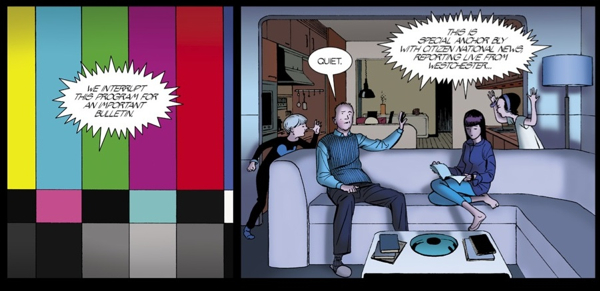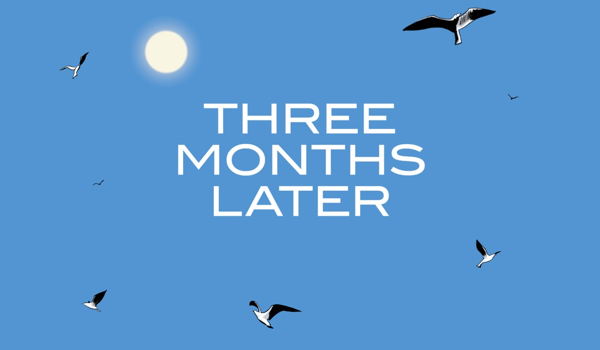With the whole series over as of last week’s tenth and final chapter, I’ve been thinking a lot about The Private Eye, A.K.A. “that other Brian K. Vaughan book, the one that’s not Saga.” I’m unsure if it’s the fact that it’s been a digital-only release, or the irregular release schedule, that’s to blame, but it feels like it’s been something that’s been somewhat overlooked in terms of the larger comic book conversation, even as Saga has become accepted as The Next Big Thing.

Of course, it might be the comic itself. I liked The Private Eye a lot, but in many ways it felt like the obtuse sibling to Saga; whereas the latter exists in a far more “out there,” science fiction-y world, what appeals about the series — for me, at least — is that it’s really a book about easily relatable emotional truths, and that those beats are at the forefront of the series. Saga, for all the talking animals and television heads, is an instantly-recognizable family drama at heart. The Private Eye, not so much.
The Private Eye has a lot of grand ideas in mind — how reliant have we become on technology, and what are we when that technology is gone? What is privacy when everything is performance? — but it’s difficult to feel as if any of them are fully explored, or in some cases, explored with any real depth. The culture on show in the series is clearly something that Vaughan and artist Marcos Martin have thought out and planned around, but not enough of that makes it onto the page, and the result is something that’s curiously unsatisfying in terms of world building, forcing the story to rest upon the appeal of the central story.
That’s where the final issue let’s everything down, at least for me. On the surface, this is a slick and professional script with big moments, sly jokes and emotional beats coming from the purposeful ambiguity of the climax. Looking at it one way, it’s all there. But… it feels lesser, somehow, than what I’d been hoping for; a summer action movie instead of anything that really addresses the ideas that were thrown around in earlier issues, but one that nonetheless resists the base-level satisfaction of the hero definitively getting to “beat” the villain. It swerves away from that at the last minute, and the result is something that just feels incomplete. It’s too smart to be mindlessly trashy, but too unwilling to fully wrestle with its own premise; I’m not sure if I was really expecting something otherwise — Vaughan’s Ex Machina had a similarly unfulfilling ending, I seem to remember, so it’s not as if I expected Vaughan to land it perfectly — but I finished the issue with a sense of Huh. Is that it? that I hadn’t really seen coming.

(That said, the humanist in me loved the “Probably had this coming! Done some shitty things in my day”/”So had every person ever, dummy!” exchange, which makes me want to forgive many sins present elsewhere in the writing.)
Of course, if I’m honest, Vaughan was never the primary selling point for The Private Eye. Since the series’ first issue, it’s always been about the visuals, with Marcos Martin and colorist Muntsa Vicente providing something so clean, so sharp and so bright that it was unlike anything else around. They don’t disappoint on this final issue, making scenes that would otherwise fall flat into something that’s visually arresting at the very least. The six page silent sequence — which, in many ways, serves as the climax of the main narrative — suggests that Vaughan realized that it was the art that was the star of the show as well, or at least more than capable of handling the heavy lifting when necessary. Unsurprisingly, they’re maybe the most enjoyable pages of the final issue.
In the end, The Private Eye falls victim to the lure of the spectacle in much the same way as the world in which it takes place, and would appear to be criticizing. There’s a lot to like in the series — really, the visuals alone would be worth the price of admission even if the series wasn’t available on the pay-what-you-want level — but there’s an emptiness at its heart that dooms it from becoming something truly great, and nowhere is that more obvious than at its ending. Given that the issue’s letter column promises a new series from this creative team, let’s hope for better things next time…



I think part of the issue is that the series feinted at being about bigger concerns involving privacy and the internet, when that was really window trappings for what it was really interested in – Raymond Chandler. And like Chandler’s work, the journey is usually more interesting than the conclusion. That said, while this was a big anti-climax (despite all the, you know, crazy climax), it was still an enjoyable series, and Martin and Vicente did some amazing work. I’m on board for whatever Panel Syndicate has next.
Agreed. He payed a lot of attention to his influences at the cost of his subject.
Spoilers here.
When reading it all at once, you kinda see where things are heading. Reading it one issue at a time, it seems early on that it will take more time to ponder it’s own world, basically be an investigation.
My prediction heading into the last issue was that PI and Raveena would realize that they were on the wrong side. I thought they would realize that even if DeGuerre was not being 100% truthful about how the internet would really work out for everyone, who would be the winners and the losers etc., they were fighting for a pretty messed up status quo, and they would let the launch happen and save the girl. That didn’t happen and that realization didn’t come until later.
Unsatisfying as it was, I still think that the way the climax at the dam unraveled was true to the story. His hero types for both Raveena and PI are legacies of pulp. Raveena is on the cathartic revenge tour, PI is the hard-boiled altruist. Though they both seek truth and justice outside the rules of their society, they are blinded by their point of view, so they are perfect characters to dupe. Then at the last second, Vaughn breaks the archetypes to finish their arcs. So in the hard-boiled detective’s nihilism, he is given the gift of a humanistic revelation and chooses to save his own life. Raveena, who cared less about the greater scheme of things than exacting revenge on her sister’s killer, keeps her innocence and opens her eyes to see the greater evils at work. Through them Vaughn shows that even the seemingly enlightened can be tricked by systems of control, but it isn’t futile to keep seeking justice. Also, by dodging the bloody revolution, the end keeps the hope alive of a peaceful road toward freedom. I think with a lot of Vaughn’s work, the ambiguity at the end is upsetting because the point of view has been there all along.